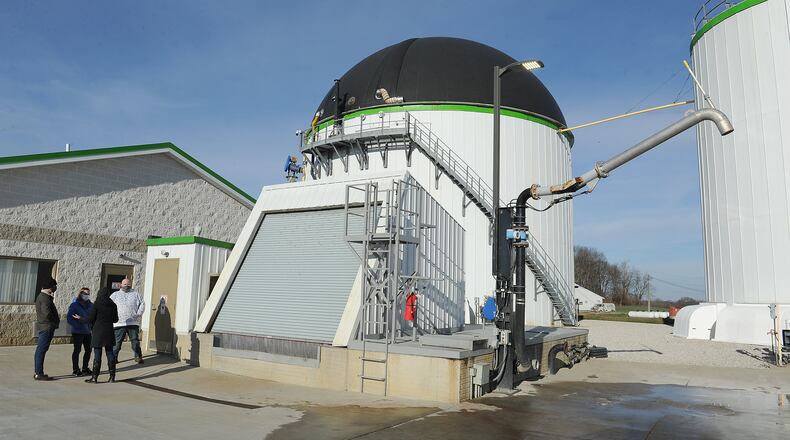The appeals court upheld a Greene County court ruling that the facility is exempt from township zoning regulations.
The decision to cites a section of Ohio law that confers “no power on any board of township trustees or board of zoning appeals” to regulate public utilities. The decision also states that Greene County was correct in not remanding the case back to the township’s Board of Zoning Appeals, and in ordering the board to grant Dovetail’s request for an exemption to expand the facility.
Renergy operates the Dovetail biodigester at 1156 Herr Road in Bath Twp. outside Fairborn. Anaerobic digesters are enclosed facilities in which manure and food waste is stored to produce fertilizer and methane gas, which is used to power neighboring homes. The electricity produced by Dovetail is publicly distributed through FirstEnergy.
Renergy officials said that with the ruling, their hope is to work together with the community and the newly elected trustees. They called on Bath Twp officials to tour the facility for themselves.
“With this process, it’s been extremely challenging. All of the time and resources the EPA has brought down, all the time they spent on us trying to find a source and finding nothing,” Renergy COO Cari Oberfield said. “Any allegation that we have done anything to harm anyone’s air or water, there’s no evidence supporting that.”
The Public Utilities Commission of Ohio has previously stated they don’t regulate facilities like Dovetail. For this reason, the group Bath Biodigester Concerned Citizens has recently been calling on state legislators to address this, using recent legislation like Senate Bill 52 as a template, which allowed for local government regulation of solar and wind farms. Biodigesters are heavily regulated by the Environmental Protection Agency, but their status as a utility may leave a regulatory gap with local governments.
“Petitioning is the next legal logical step,” said newly elected Bath Twp. trustee Rob Hoffman. “There’s the environmental side making sure the EPA is doing what it’s supposed to do, and the legal side with the court system. I still can’t fathom how we have zero local control over a huge thing that is negatively impacting our community.”
“I’m not anti-green energy,” Hoffman added. “If we can take waste and dispose of it in a way that produces energy, I’m all for it, but not when it affects tens of thousands and their air and water quality. It has to be done right, that’s the bottom line.”
Bath Twp. trustees will publicly discuss their next steps Wednesday, which may be to petition the Supreme Court of Ohio, Hoffman said. Westfield Twp. in Morrow County, the site of Dovetail’s sister facility, Emerald Bioenergy, has already petitioned the Ohio Supreme Court, but it is yet to be determined whether the Court will hear the case.
“We feel confident it won’t be heard, especially due to the stipulation of facts,” Oberfield said. “It’s unfortunate that instead of ending this and working together with the township to move forward, we’re utilizing more resources to continue this process.”
The Bath Twp. Board of Zoning Appeals ruled in March 2020 that the Dovetail was not an operation for agricultural zoning, but industrial zoning. The company appealed the BZA ruling, and Greene County Common Pleas Judge Michael Buckwalter sided with Renergy in May 2021.
About the Author

